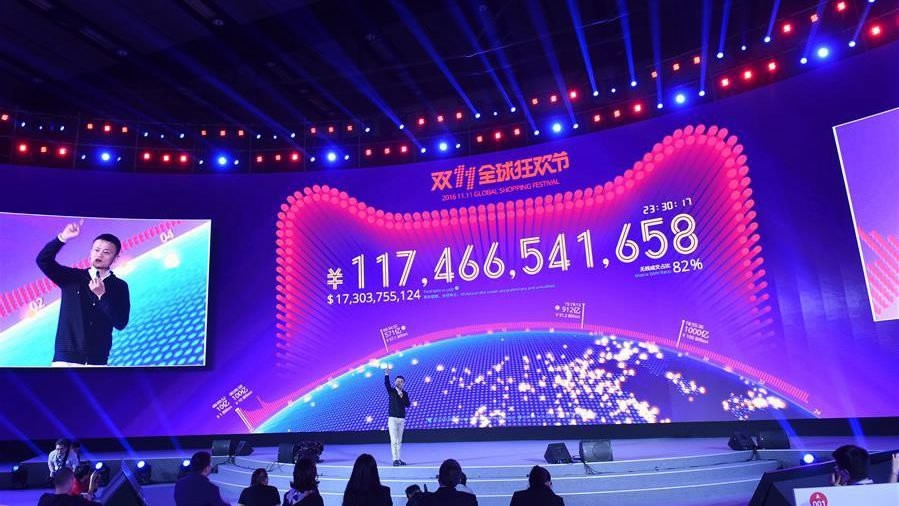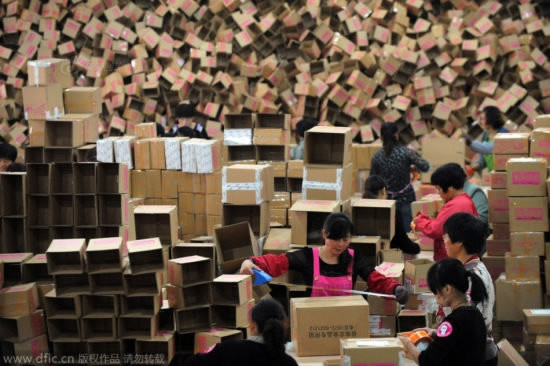
Tech & Sci
15:37, 10-Nov-2017
China's Internet giants look to go green ahead of "Singles' Day"
Alok Gupta

China’s e-commerce giants have implemented green initiatives for the "Singles' Day" shopping spree. The annual online shopping festival offers massive discounts boosting online sales, but also leading to the piling-up of packaging waste at landfills.
Three major online retailers, Alibaba, Suning and JD.com, will process millions of online orders on November 11. To counter the tons of packaging at landfills, they have initiated a few baby steps to tackle the waste.
Suning has launched reusable packaging for express deliveries in 13 cities. The collapsible plastic boxes can be re-used more than 1,000 times, and are priced at 25 yuan (3.75 US dollars) each. The company is trying to boost the use of these boxes by setting a target of having 200,000 consumers by 2020.
JD.com has decided to reduce the width of its packaging tape from 53mm to 45mm, and also plans to use biodegradable glues. Alibaba Group's green packaging initiative Cainiao will put into service 20 of its green warehouses to use easy-to-recycle and biodegradable materials for packaging.
Meanwhile, the State Post Bureau (SPB) on Thursday announced that it will ensure 50 percent of its packaging will be biodegradable by 2020. It will also look to reduce by 10 percent the packaging material used for each parcel.
'Three times more than Black Friday and Cyber Monday combined'
China dominates the global online retail market with a 36 percent share in the global online retail market, which is worth nearly 1.34 trillion US dollars. E-commerce has seen a significant boom in the last five years.

More than 200 employees busy packing goods in the early morning of November 11, 2014 in a 800㎡ garage of an e-commerce company in Changxing city, Zhejiang Province. /Xinhua Photo
More than 200 employees busy packing goods in the early morning of November 11, 2014 in a 800㎡ garage of an e-commerce company in Changxing city, Zhejiang Province. /Xinhua Photo
Chinese e-commerce revenues surpassed 298 billion US dollars in 2013, and a year later sales grew to 448 billion US dollars.
But nothing compares to the figures seen on the "Singles' Day". According to various estimates, the November 11 sales volume in China is nearly three times more than Black Friday and Cyber Monday combined.
Last year on that day, Alibaba alone mopped up nearly 18 billion US dollars in gross merchandise value, up by 32 percent from 2015. For November 11, 2017, Alibaba is promising 15 million product listings from more than 140,000 different brands.
Tackling e-commerce's mountain of waste
According to an estimate by the SPB, there will be around 1.5 billon packages delivered from November 11 to 16, Xinhua reported. The SPB will handle nearly 35 percent more parcels compared to last year.
In 2016, more than 30 billion packages were delivered to homes across the country. These packages consumed enough adhesive tape to wrap around the Earth 700 times, according to SPB estimates.
According to a study, "China’s Environmental Threats of Internet Shopping Packaging Wastes," one of the major reasons behind the growing mountain of packaging waste in the country is the excessive use of packaging by e-commerce giants.
The primary raw material for packaging, adhesive tape, in China is PVC (polyvinyl chloride), which takes at least 100 years to degrade in soil and severely pollutes the environment before degradation. The glue also damages human skin and respiratory tract because of the formaldehyde and benzene chemicals used in its ingredients.
The study recommends that to reduce packaging waste, the government should start charging an environmental protection tax on e-commerce giants, set up recycling units, create benchmark or standards for packaging material and create wider public awareness.

SITEMAP
Copyright © 2018 CGTN. Beijing ICP prepared NO.16065310-3
Copyright © 2018 CGTN. Beijing ICP prepared NO.16065310-3